
Richard Thompson is an English singer, songwriter, and guitarist.
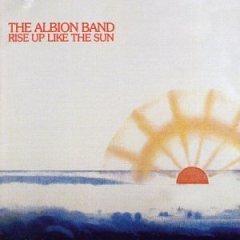
Rise Up Like the Sun is a British folk rock album released in 1978 by The Albion Band. The album is in part a collaboration between John Tams on vocals and melodeon and Ashley Hutchings on electric bass. This is not the first album on which the two worked together but it remains the most fulfilling for listeners. To build the sound Hutchings brought in two of his former compatriots from Fairport Convention, Dave Mattacks on drums and tambourine and Simon Nicol on vocals and electric and acoustic guitars. In addition another ex-member of Fairport, Richard Thompson, contributed songs and backing vocals. Having assembled the principal contributors and an ambiance that encouraged their friends to drop in, Hutchings gave Tams the freedom to act as the project's musical director. They were joined by Philip Pickett on shawms, bagpipes, curtals and trumpet, Pete Bullock on synthesiser, piano, clarinet, sax, and organ, Michael Gregory on percussion, Ric Sanders on violin and violectra and Graeme Taylor on electric and acoustic guitars. Kate McGarrigle, Julie Covington, Linda Thompson, Pat Donaldson, Martin Carthy, Andy Fairweather-Low and Dave Bristow make guest appearances.
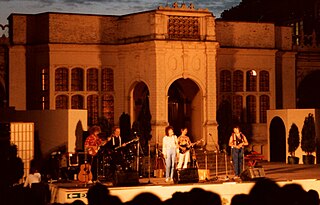
The Albion Band, also known as The Albion Country Band, The Albion Dance Band, and The Albion Christmas Band, is a British folk rock band, originally brought together and led by musician Ashley Hutchings. An important grouping in the genre, it has contained or been associated with a large proportion of major English folk performers in its long and fluid history.
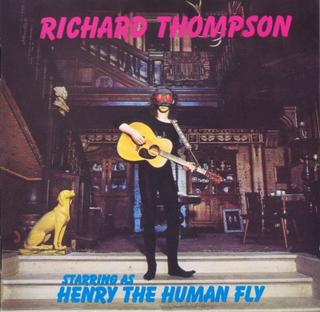
Henry the Human Fly is the debut solo album by Richard Thompson, his first release following his leaving former group Fairport Convention. It was released on the Island label in the U.K. and the Reprise label in the U.S.A. in April 1972. The album was reissued by Rykodisc in 1991.

I Want to See the Bright Lights Tonight is the second album released by Richard Thompson, and his first to include his then wife, Linda Thompson, the pair being credited as Richard and Linda Thompson. It was issued by Island Records in the UK in 1974. Although the album was never commercially successful, and was critically ignored upon its release, it is now considered by several critics to be a masterpiece and one of the finest releases by the two singers, whether working singly or together.

Hokey Pokey is the second album by the British duo of singer Linda Thompson and singer/songwriter/guitarist Richard Thompson. It was recorded in the autumn of 1974 and released in the year 1975.
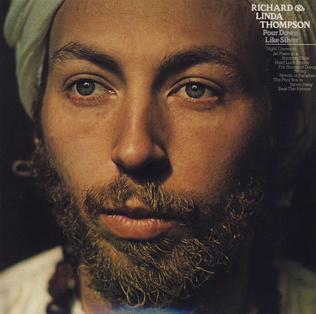
Pour Down Like Silver is the third album by the British duo of singer-songwriter and guitarist Richard and vocalist Linda Thompson. It was recorded in the summer of 1975 and released in November 1975.

Sunnyvista is the fifth album by Richard and Linda Thompson, released in 1979, by Chrysalis Records.

Shoot Out the Lights is the sixth and final album by British husband-and-wife rock duo Richard and Linda Thompson. It was produced by Joe Boyd and released in 1982 on his Hannibal label. A critically acclaimed work, AllMusic's Mark Deming noted that Shoot Out the Lights has "often been cited as Richard Thompson's greatest work."

(guitar, vocal) is a 1976 album by Richard Thompson. It was released by Island Records as a career retrospective after he and his wife Linda had gone into semi-retirement from the business of making and performing music following the release of Pour Down Like Silver (1975).
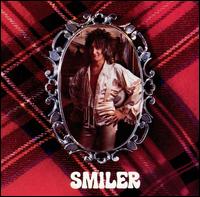
Smiler is the fifth solo album by English rock singer-songwriter Rod Stewart. It was released September 27, 1974 by Mercury Records. It reached number 1 in the UK album chart, and number 13 in the US. The album included covers of Chuck Berry, Sam Cooke and Bob Dylan songs, as well as a duet with Elton John of John's song "Let Me Be Your Car". Stewart also covered Carole King's "(You Make Me Feel Like) A Natural Woman" where 'Woman' is switched to 'Man'. The release of the album was held up for five months due to legal problems between Mercury Records and Warner Bros. Records.

Simon John Breckenridge Nicol is an English guitarist, singer, multi-instrumentalist and record producer. He was a founding member of British folk rock group Fairport Convention and is the only founding member still in the band. He has also been involved with the Albion Band and a wide range of musical projects, both as a collaborator, producer and as a solo artist. He has received several awards for his work and career.

Powerglide is the second album by the American band the New Riders of the Purple Sage. The music is a psychedelic hybrid of country rock, and includes guest musicians Jerry Garcia and Bill Kreutzmann from the Grateful Dead, along with noted session player Nicky Hopkins. The album contains six original tunes by the band, plus covers such as "I Don't Need No Doctor", "Hello Mary Lou", and "Willie and the Hand Jive".

Rock On is a 1972 one-off album of oldies covers by The Bunch, a group of English folk rock singers and musicians. The Bunch was put together by Trevor Lucas in late 1971 to record this sole album. This album consisted of covers of the band’s favourite songs by Elvis Presley, Buddy Holly, and The Everly Brothers, amongst others.

I've Got My Own Album to Do is the first solo album by English rock musician Ronnie Wood, released in September 1974. An all-star project recorded outside of his activities with the Faces, it reached number 27 on the UK's NME chart. The album title was thought to be a dig at Rod Stewart, who appeared to be more committed to his solo career than working with the Faces. Wood has said that the title originated from contributors such as George Harrison and Mick Jagger "nagging me to let them go home" and finish their own projects. The album was recorded at The Wick, Wood's house in Richmond, south-west London.

Now Look is the second solo album by English musician Ronnie Wood, released in July 1975. In the United States, it peaked at number 118 on Billboard's top 200 albums listings, during a six-week chart run. Produced by Wood, Bobby Womack and Ian McLagan, the album also includes musical contributions from Keith Richards, Mick Taylor, Willie Weeks and Andy Newmark – all of whom had played on Wood's debut, I've Got My Own Album to Do.

Give Thankx is the twelfth album by Jimmy Cliff.

Fairport Chronicles is a 1976 compilation album of the British folk-rock band Fairport Convention, including songs from 1968 to the departure of the last original member in 1972. The double album is unique in that it was only released in the USA, features original material and American covers over the traditional material usually associated with Fairport, and includes songs from side projects. All of the material was originally issued in the USA on A&M Records, which explains the exclusion of songs taken from their first, pre-Sandy Denny album, which was only later released in the United States.

Richard Thompson - Live at the BBC is a compilation of audio and video recordings made by Richard Thompson for the BBC. The set consists of three CDs and a DVD. The included material was recorded over a number of years; the earliest tracks date back to 1973, the most recent to 2009. Most of the material was recorded for various TV and radio shows broadcast by the BBC. About 40% of the included material was performed by Richard and Linda Thompson.

Julie Covington is a 1978 album by English singer Julie Covington. It was produced by Joe Boyd and the sound engineer was John Wood. Most of the album was recorded at Britannia Row Studios in Islington. It was her second album released on Virgin Records. In 2000, it was reissued as Julie Covington Plus and features two bonus tracks.




















